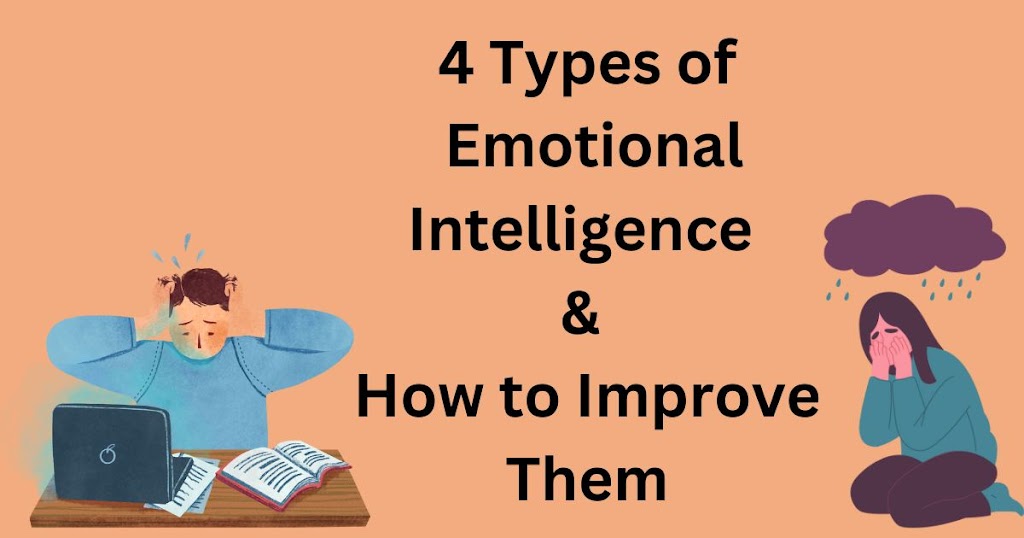Last updated on February 7th, 2026 at 10:04 am
Have you ever thought about the 4 Types of Emotional Intelligence & How to Improve Them and why some people are great at connecting with others and handling tough situations? This special skill is known as Emotional Quotient (EQ). In today’s busy life, having strong emotional intelligence is very important. Whether you want to do well at work, improve your friendships, or deal with life’s challenges, understanding the types of emotional intelligence can make a big difference.
What is Emotional Intelligence?
Emotional intelligence refers to the ability to recognize, understand, and manage one’s own emotions and those of others. According to Daniel Goleman, a pioneer in the field, EI is a crucial factor influencing how we interact with others, make decisions, and handle stressful situations. Research shows that emotional intelligence is a better predictor of success than IQ.
EI’s Growing Importance in the Workforce (2024)
Recent findings from the World Economic Forum highlight that emotional intelligence will be one of the most important skills for 2025, particularly due to the rise of automation and AI. As workplaces become more technology-driven, the ability to connect emotionally and manage relationships is becoming increasingly valuable.
Key Components of Emotional Intelligence
Emotional intelligence is made up of several key components that work together to help individuals excel in their personal and professional lives:
2. Self-Regulation: Healthily managing your emotions, especially in challenging situations.
3. Social Awareness: Recognizing and understanding the emotions of others, and empathizing with them.
4. Relationship Management: Building strong, healthy relationships through effective communication, collaboration, and conflict resolution.
Exploring The 4 Types of Emotional Intelligence
To better understand emotional intelligence, let’s break it down into four distinct types. Each type focuses on a different aspect of EI and plays a unique role in shaping your behavior and interactions with others.
1. Intrapersonal Intelligence
Intrapersonal intelligence refers to your ability to understand and regulate your own emotions. It involves self-awareness and self-regulation, which are foundational to emotional intelligence.
- Key Characteristics: Recognizing your emotional state, managing impulses, and maintaining self-control.
- Statistics: A Talent Smart study found that 90% of top performers possess high emotional intelligence, particularly intrapersonal skills.
- Key Takeaway: To enhance intrapersonal intelligence, reflect on your emotions regularly, practice mindfulness, and strive for self-awareness. Keeping a journal can help track your emotions and their impact on your daily decisions.
2. Interpersonal Intelligence
Interpersonal intelligence focuses on your ability to understand and interact with others. It involves social awareness and relationship management, which are critical for building strong, collaborative relationships.
- Key Characteristics: Empathy, active listening, and understanding other’s emotional needs.
- Statistics: Research from the Hay Group revealed that leaders with high interpersonal intelligence can boost team performance by 20%.
- Key Takeaway: Improving interpersonal intelligence requires practicing empathy, listening attentively to others, and responding to their emotional cues. This can lead to stronger, more effective relationships in both personal and work settings.
3. Emotional Perception
Emotional perception is the ability to recognize and interpret emotional signals, both in yourself and others. This involves understanding facial expressions, body language, and tone of voice.
- Key Characteristics: Being able to identify emotions based on non-verbal cues and understanding their context.
- Statistics: A World Economic Forum survey highlighted emotional perception as one of the top 10 skills needed for the workforce in 2025.
- Key Takeaway: To sharpen your emotional perception, pay close attention to body language, facial expressions, and other non-verbal cues in your daily interactions.
4. Emotional Regulation
Emotional regulation refers to the ability to manage and control your emotions healthily, especially during stress or conflict. This skill is essential for maintaining mental well-being and resilience.
- Key Characteristics: Managing emotional reactions, staying calm under pressure, and adjusting emotions to fit the situation.
- Statistics: Studies show that individuals with high emotional regulation are 30% less likely to experience burnout, making emotional regulation crucial for stress management.
- Key Takeaway: Developing emotional regulation involves practicing techniques like mindfulness, deep breathing, and stress management exercises to help you remain balanced in challenging situations.
Examples of EI in the Workplace
Related Read: How Childhood Experiences Shape Personality Development
The Role of EI in Mental Health
 |
| 4 Types of Emotional Intelligence & How to Improve Them |
Addressing EI in the Context of Global Crisis or Change
Why Emotional Intelligence Matters
Emotional intelligence is essential for success in various aspects of life. Here’s how it impacts personal and professional growth:
2. Better Relationships: People with high emotional intelligence tend to have healthier, more fulfilling relationships due to their ability to empathize and connect with others.
4. Increased Resilience: Emotional intelligence builds resilience, enabling individuals to cope with stress and adapt to changes more effectively.
How to Improve Your Emotional Intelligence
Developing your emotional intelligence is a lifelong process, but small steps can lead to significant improvements. Here are some practical tips for enhancing each type of emotional intelligence:
- Practice Self-Awareness: Regularly reflect on your emotions and behaviors. Journaling your feelings and experiences can help you identify patterns and triggers.
- Improve Self-Regulation: Practice mindfulness, deep breathing, or other relaxation techniques to stay calm under pressure and manage your emotional responses.
- Develop Empathy: Try to understand other’s perspectives by actively listening and asking open-ended questions. Empathy enhances your ability to connect with people on a deeper level.
- Strengthen Social Skills: Focus on building your communication skills, working on conflict resolution, and collaborating effectively with others.
Linking EI to Leadership in the Digital Age
As remote work continues to grow, digital emotional intelligence—the ability to understand and manage emotions in online environments—has become an essential skill for leaders and team members. Effective virtual leadership relies on recognizing emotional cues in video calls, understanding the tone in emails, and fostering connection despite physical distance.
Final Thoughts
Emotional intelligence is a powerful skill that can help you reach your full potential in life, both personally and at work. By learning about and improving the four types of emotional intelligence—self-awareness, self-regulation, empathy, and social skills—you can become stronger, more successful, and better connected to the people around you.
To begin improving your emotional intelligence today, consider starting with these simple steps: take an EI self-assessment, practice active listening in your daily conversations, or read books like Emotional Intelligence by Daniel Goleman to deepen your understanding.

